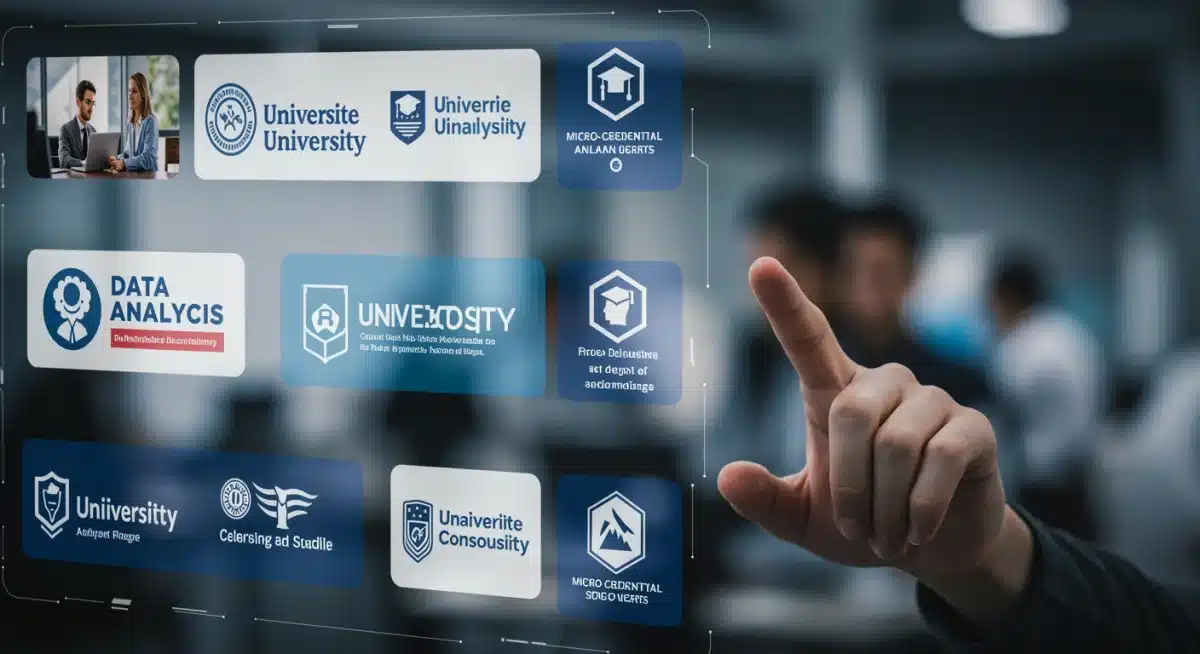Micro-Credentials: US Universities Adapting for 2025 Job Markets

US universities are rapidly adopting micro-credentials to meet the dynamic demands of the 2025 job market, offering focused, flexible, and career-relevant education that enhances workforce readiness and addresses specific skill gaps.
The landscape of higher education is undergoing a significant transformation, driven by the rapidly evolving demands of the global workforce. As we approach 2025, a critical shift is occurring in how US universities prepare students for future careers: the widespread adoption of micro-credentials US universities are now offering. This innovative approach to learning is reshaping traditional academic models, focusing on agility and direct relevance to employer needs.
Understanding the Micro-Credential Phenomenon
Micro-credentials represent a paradigm shift in education, moving away from lengthy degree programs towards focused, verifiable units of learning. These credentials acknowledge specific skills or competencies acquired through short courses, bootcamps, or project-based learning. They are designed to be stackable, allowing individuals to build a comprehensive skill set tailored to their career aspirations and the demands of the modern job market.
The appeal of micro-credentials lies in their flexibility and direct applicability. Unlike traditional degrees that can take years to complete, micro-credentials can be earned in a matter of weeks or months, providing a faster pathway to acquiring in-demand skills. This agility is crucial in today’s fast-paced economic environment, where new technologies and industry requirements emerge constantly.
Defining Micro-Credentials
- Focused Learning: Each micro-credential targets a specific skill or competency, such as data analytics, cybersecurity fundamentals, or project management.
- Verifiable Outcomes: Learners typically demonstrate proficiency through assessments, projects, or portfolios, ensuring employers can trust the acquired skills.
- Stackable: Multiple micro-credentials can be combined to form a broader qualification or even contribute towards a traditional degree program.
- Flexible Delivery: Often delivered online or in hybrid formats, making them accessible to working professionals and diverse learners.
In essence, micro-credentials are not merely certificates of completion; they are robust indicators of demonstrated ability. This distinction is vital for employers who seek concrete evidence of skills rather than just academic attainment. The rise of these credentials signals a more granular and responsive approach to workforce development, directly addressing the skill gaps identified by industries.
The concept of micro-credentials is gaining traction because it offers a practical solution to the ever-widening gap between traditional academic offerings and the dynamic needs of the labor market. By providing targeted training, universities can help individuals quickly adapt to new roles and technologies, fostering a more agile and skilled workforce ready for 2025 and beyond.
Why US Universities Are Embracing Micro-Credentials
US universities are not just observing the micro-credential trend; they are actively integrating it into their educational frameworks. This embrace stems from a recognition of several key factors influencing the future of higher education and employment. Universities are realizing that traditional degree structures alone may not be sufficient to meet the diverse and evolving needs of learners and employers.
One primary driver is the demand from students themselves for more flexible, affordable, and career-relevant education. Many prospective students, especially adult learners or those seeking career changes, cannot commit to a four-year degree but need specific skills to advance. Micro-credentials offer a viable alternative, providing pathways to professional growth without the time and financial commitment of a full degree program.
Meeting Industry Demands
- Skill Gaps: Industries constantly report shortages in specific areas like AI, cloud computing, and advanced manufacturing. Micro-credentials directly address these gaps.
- Rapid Technological Change: The pace of innovation means skills can become outdated quickly. Micro-credentials allow for continuous upskilling and reskilling.
- Employer Preference: A growing number of employers value demonstrated skills and competencies, which micro-credentials explicitly provide.
Furthermore, universities are under pressure to demonstrate their value and relevance in an increasingly competitive educational landscape. By offering micro-credentials, institutions can broaden their reach, attract a more diverse student body, and forge stronger partnerships with industries. This strategic pivot ensures universities remain central to workforce development, adapting their offerings to reflect the real-time needs of the economy.
The move towards micro-credentials also allows universities to experiment with new pedagogical approaches and digital learning tools. This innovation not only enhances the learning experience but also positions institutions at the forefront of educational technology. Ultimately, the adoption of micro-credentials is a strategic move for US universities to stay competitive, relevant, and responsive to the future of work.
Adapting Curricula for the 2025 Job Market
The integration of micro-credentials necessitates a significant adaptation of university curricula. This is not simply about adding new courses but re-evaluating existing programs and rethinking how knowledge and skills are packaged and delivered. For the 2025 job market, curricula must be agile, interdisciplinary, and deeply connected to industry needs.
Universities are increasingly collaborating with industry leaders to identify critical skills gaps and co-design micro-credential programs. This direct engagement ensures that the content is highly relevant and that graduates possess the competencies employers are actively seeking. The traditional academic silo approach is giving way to more integrated and practical learning experiences.

Key Curricular Adjustments
- Modular Design: Breaking down traditional courses into smaller, digestible modules that can stand alone as micro-credentials or be combined.
- Competency-Based Learning: Shifting focus from seat time to demonstrated mastery of specific skills and learning outcomes.
- Experiential Learning: Incorporating more project-based work, internships, and simulations to provide practical experience.
- Interdisciplinary Focus: Creating programs that blend skills from different fields, recognizing that modern jobs often require a diverse skill set.
Beyond content, universities are also adapting their delivery methods. Online and hybrid formats are becoming standard, offering greater accessibility and flexibility for learners. This includes leveraging advanced learning technologies, such as AI-powered tutoring and virtual reality simulations, to create engaging and effective learning environments.
The goal is to create a seamless learning ecosystem where students can acquire both broad foundational knowledge and specialized, career-specific skills. By adapting their curricula in these ways, US universities are ensuring their graduates are not only well-educated but also highly employable and prepared for the challenges and opportunities of the 2025 job market.
Benefits for Students and Workforce Development
The rise of micro-credentials offers substantial benefits for students, enhancing their career prospects and providing flexible learning pathways. For workforce development, these credentials are a game-changer, fostering continuous learning and a more adaptable labor force. This dual impact underscores their importance in the evolving educational and economic landscape.
Students gain a competitive edge by acquiring specific, in-demand skills that are recognized and valued by employers. Unlike traditional degrees, which can be broad, micro-credentials provide targeted evidence of proficiency. This can lead to faster entry into specific roles, career advancement, or successful transitions into new industries.
Advantages for Learners
- Enhanced Employability: Direct alignment with employer needs increases job readiness and career opportunities.
- Career Agility: Ability to quickly reskill or upskill to adapt to changing job market demands and pursue new career paths.
- Reduced Cost and Time: Shorter programs with lower tuition fees compared to full degree programs.
- Personalized Learning: Opportunity to build a customized skill portfolio based on individual career goals.
From a broader workforce development perspective, micro-credentials contribute to a more skilled and resilient economy. They enable companies to address internal skill gaps by upskilling their existing employees, reducing the need for extensive external hiring. This ongoing development ensures that the workforce remains relevant and productive in the face of technological advancements and economic shifts.
Moreover, micro-credentials promote lifelong learning, encouraging individuals to continuously invest in their education and professional growth. This culture of continuous improvement is essential for sustained economic competitiveness and individual career longevity. The accessibility and flexibility of these programs mean that a wider demographic can participate in advanced learning, leading to a more inclusive and diverse talent pool.
Ultimately, micro-credentials serve as a bridge between education and employment, ensuring that skills acquired are directly transferable to the workplace. This benefits not only the individual learner but also employers and the economy as a whole, preparing everyone for the demands of the 2025 job market.
Challenges and Opportunities for Universities
While the adoption of micro-credentials presents numerous opportunities for US universities, it also comes with its share of challenges. Institutions must navigate issues related to quality assurance, recognition, funding models, and integration with existing academic structures. Addressing these complexities is crucial for the successful scaling and acceptance of micro-credential programs.
One significant challenge is ensuring the consistent quality and rigor of micro-credentials. Unlike traditional degrees with established accreditation processes, the standards for micro-credentials are still evolving. Universities must develop robust assessment methods and quality frameworks to maintain their reputation and ensure employer trust in these new offerings.
Navigating the Landscape
- Accreditation and Recognition: Establishing clear standards and pathways for micro-credential recognition by employers and other educational institutions.
- Funding Models: Developing sustainable financial models that support the creation and delivery of micro-credential programs, potentially differing from traditional tuition structures.
- Faculty Development: Training faculty to design and deliver competency-based, modular learning experiences.
- Integration with Traditional Programs: Effectively blending micro-credentials into existing degree pathways to create flexible, stackable learning opportunities.
Despite these challenges, the opportunities are immense. Universities can leverage micro-credentials to expand their market reach, attracting new segments of learners who might not pursue a traditional degree. This includes working professionals seeking specific skills, individuals looking for career changes, and those in underserved communities who benefit from flexible, accessible education.
Furthermore, micro-credentials can foster deeper connections between universities and industry. By co-creating programs and offering tailored training, institutions can become indispensable partners in workforce development, driving innovation and economic growth. This symbiotic relationship strengthens the university’s role as a vital contributor to society and the economy.
The successful integration of micro-credentials will require strategic planning, investment in technology, and a willingness to innovate. Universities that embrace these changes will be well-positioned to thrive in the evolving educational landscape, adapting effectively to the needs of the 2025 job market and beyond.
Looking Ahead: The Future Role of Micro-Credentials
The trajectory of micro-credentials suggests they will play an increasingly prominent role in the future of education and employment. As the 2025 job market approaches, these focused learning units are poised to become a standard component of both academic portfolios and professional development. Their evolution will likely involve greater standardization, broader acceptance, and deeper integration into career pathways.
Expect to see more sophisticated ecosystems emerge where micro-credentials from various institutions and providers can be easily combined and recognized. This interoperability will unlock new possibilities for personalized learning and career progression, allowing individuals to curate unique skill sets that precisely match their ambitions and market demands.
Envisioning the Future
- Standardized Frameworks: Development of common frameworks and digital infrastructures for issuing, verifying, and stacking micro-credentials across different platforms.
- AI-Driven Personalization: Increased use of AI to recommend personalized micro-credential pathways based on individual learning styles, career goals, and real-time job market data.
- Employer Integration: Deeper embedding of micro-credentials into corporate training programs and hiring processes, making them a key currency in the talent market.
- Global Recognition: Growth in international recognition of micro-credentials, facilitating global talent mobility and cross-border skill development.
The shift towards a skills-based economy will accelerate the relevance of micro-credentials. Employers will increasingly prioritize demonstrated competencies over traditional degrees alone, leading to a broader acceptance of these credentials as valid indicators of professional capability. This will empower individuals to showcase their specific talents more effectively.
Universities will continue to innovate, offering a hybrid model that blends traditional degree programs with flexible micro-credential options. This integrated approach will cater to a wider range of learners, from traditional undergraduates to seasoned professionals seeking to upskill. The future of higher education will be characterized by greater agility, responsiveness, and a continuous focus on career readiness.
Ultimately, micro-credentials are not just a temporary trend but a fundamental recalibration of how education serves the workforce. They represent a dynamic and adaptable solution to the ever-changing demands of the job market, ensuring that individuals and economies remain competitive and thriving in the years to come.
| Key Point | Brief Description |
|---|---|
| Skill-Based Learning | Micro-credentials focus on specific, verifiable skills, directly addressing industry needs. |
| University Adaptation | US universities are integrating micro-credentials into curricula for flexibility and relevance. |
| Job Market Readiness | These credentials equip learners with in-demand skills, enhancing employability for 2025. |
| Future of Education | Micro-credentials are set to become a core component of lifelong learning and career pathways. |
Frequently Asked Questions About Micro-Credentials
Micro-credentials are short, focused units of learning that certify specific skills or competencies. They are typically earned faster than traditional degrees and are designed to be highly relevant to immediate job market demands, offering verifiable proof of expertise in a particular area.
US universities benefit by expanding their reach to new learner demographics, enhancing their relevance to industry, and fostering stronger partnerships with employers. They also provide flexible revenue streams and allow institutions to innovate their pedagogical approaches.
They prepare students by providing targeted, in-demand skills that are directly applicable to emerging roles and industries. This allows for faster upskilling and reskilling, equipping individuals with the agility needed to adapt to rapid technological and economic changes expected by 2025.
Yes, recognition is growing significantly. As industries increasingly prioritize demonstrated skills over traditional qualifications, employers are actively seeking candidates with verifiable micro-credentials in specific areas like data science, cybersecurity, and digital marketing, viewing them as valuable indicators of capability.
Absolutely. Many universities are designing micro-credentials to be stackable, meaning they can count towards a larger certificate or even a traditional degree. This offers students a flexible pathway to build comprehensive qualifications and enhance their academic and professional portfolios.
Conclusion
The journey towards 2025 signifies a pivotal moment for higher education in the United States, marked by the transformative impact of micro-credentials. US universities are demonstrating remarkable foresight and adaptability by integrating these agile, skill-focused learning units into their core offerings. This strategic shift is not merely a response to current trends but a proactive measure to ensure that graduates are exceptionally well-prepared for the dynamic demands of the future job market. By fostering a culture of continuous learning, bridging the gap between academic theory and practical application, and prioritizing relevant, verifiable skills, micro-credentials are solidifying their place as an indispensable component of modern education. Their rise underscores a fundamental re-evaluation of how value is delivered and recognized in the pursuit of lifelong professional success and economic resilience.





